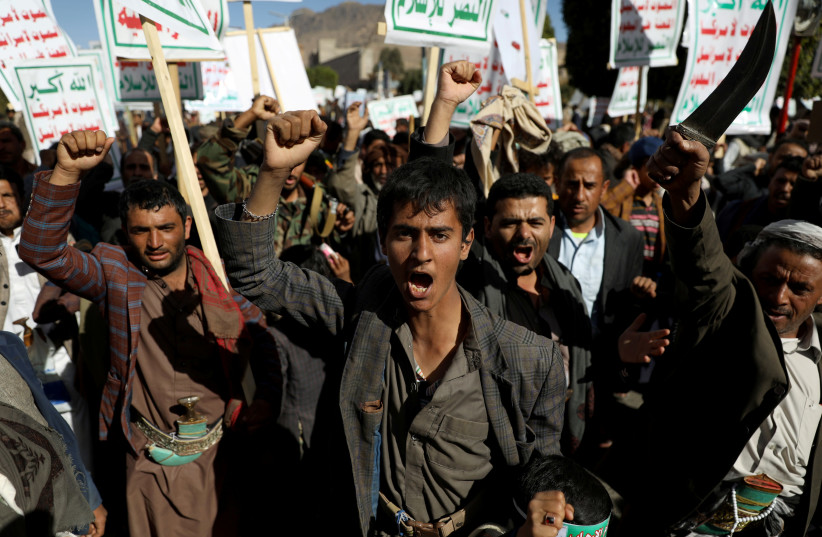As the world tries to recover from the COVID-19 pandemic, Yemen is struggling with a humanitarian crisis that cannot be resolved with Biden’s Iran appeasement policy, which fails in countering Iran’s efforts in backing the Houthi movement.
Iranian officials continue to deny that they offer military support to Houthi rebels in Yemen. In October 2019, Iran’s Chief of Staff (the most senior military position available in Iran) Major General Mohammad Bagheri, declared that “Iranian assistance to the Houthis was limited to the consultative and ideological aspects”.
However, evidence continues to mount that Tehran backs the rebels. In February 2020, the United States (US) Department of Defense revealed the scale of Iran’s complicity in backing the Houthis, particularly supplying lethal drones. More recently, in January 2022, the US navy stopped a ship from Iran, carrying 40 tons of fertilizer that may be used to make explosives, to back the Houthi militia.
The disinformation conducted by Iran about its involvement is worsening the situation because they are, according to the United Nations (UN), the source and origin of weapons that are being used and they continue to fuel a tangled conflict. Back in 2016, the US Navy seized an Iranian weapons shipment, confiscating many arms, grenade launchers and AK-47 rifles, the Pentagon stated afterwards that it was likely headed to Yemen. As a matter of fact, under an international arms embargo on Yemen, Iran is prohibited by UN resolution 2216 (2015) from selling or sending weapons to Yemen, but the United Nations panel’s report highlighted that the Islamic Republic of Iran is in noncompliance with the resolution.
Additionally, in 2019, the Houthis repeatedly used identical drones to Iran’s HESA Ababil-T drones against Saudi Arabia. Later on, the US Navy’s Ticonderoga-class guided-missile cruiser, USS Normandy (CG-60), seized Iranian anti-tank missiles and other munitions, which include Iranian-manufactured copies of Russian Kornet ATGMs, man-portable anti-tank guided missiles, which were intended for the Houthis in the Arabian Sea.
The Houthis are seeking more support from Iran for mainly two reasons: First, they need to leverage on the military and intelligence support from Hezbollah and the Iranian Islamic Revolutionary Guard Corps to have a strong position when negotiating with Saudi Arabia and the United Arab Emirates (UAE), who are currently mainly concerned about the protection of their borders with Yemen and their oil facilities. Second, they need to prove to their Zaydi community supporters that they have the necessary weapons and other means, not only to take over all the Northern Yemeni region, but to maintain their presence long-term. On March 2020, a group of Houthi rebels took control of large parts of the strategic Al-Jawf governorate in the north of Yemen.

The Biden administration, as much as it is a mediator for peace, should remain committed to exposing Iranian links with the Houthis in order to identify the actors of the civil war and to confront Iran directly in order to get an overview of the specific interests, either general or operational, that gather them. It is only by assembling this puzzle that it will be possible to negotiate a reasonable peace treaty with the Houthis that would solve the Yemeni crisis. It is also urgent to do so, as Al-Qaeda’s Yemen Branch, al-Qaeda in the Arabian Peninsula (AQAP), currently located in the provinces of Shabwah and Hadramawt, is seeing the chaotic situation as an opportunity to emerge again.
As far as US interests are concerned, it is too late to create a legitimate and unifying Yemeni government that could work effectively by overcoming tribalism and sectarianism. The maintenance of counter-terrorism efforts are crucial to reducing Iran’s pressure on Yemen, ending the cold war between Saudi Arabia and Iran, containing the spread of the AQAP and preventing a Zayidi-Taliban state.
What remains is to find a diplomatic and political solution to diminish Iran’s involvement, since Saudi Arabia’s participation is in the process of being contained.
President Joe Biden’s Iran policy should actively work on finding a political agreement that can include the protection of Saudi Arabia and the UAE’s territory, in order to decrease the proxy war tensions in Yemen that Houthis cite to justify their actions. As long as Iran’s complicity is not confronted, the Houthis dispute over power will not end.
The writer is a master of public policy candidate at the McCourt School of Public Policy. She is also a writer and artist, and publishes her work on https://zinebriboua.substack.com.
